Iraqis' dissatisfaction with economic conditions in their country is the highest it has been in three years, highlighting the challenges the government faces as the U.S. plans to withdraw its troops.
The percentage of Iraqis who say the country's overall economy is getting worse jumped to 37% in 2011 from 20% in early 2010. Iraqis' discontent with the economic conditions in the cities and areas where they live spiked as well. Thirty percent of Iraqis now say their local economies are getting worse, double the percentage who said that in early 2010.
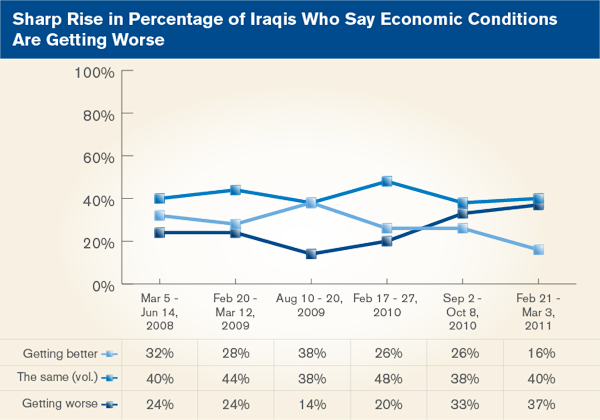
Nearly two-thirds of Iraqis say it is a bad time to find a job in the city or area where they live, up from 41% in early 2010. Sixteen percent of Iraqis - less than half the level at about the same time one year ago - say now is a good time to find a job locally.
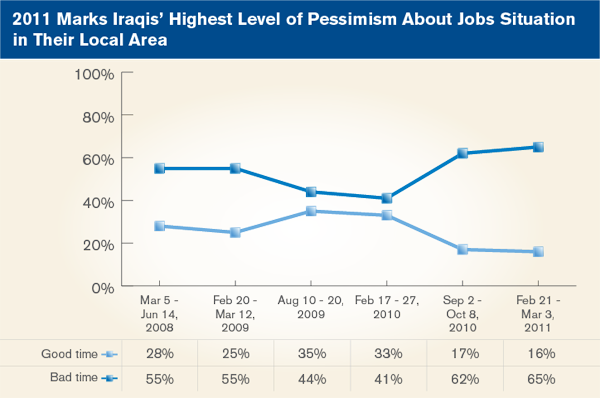
Concerns About Housing and a Declining Standard of Living
Gallup survey results hint at the devastation that eight years of war have visited on Iraq and its people's psyche. In a Gallup survey conducted in 2004 - nearly a year after forces from the U.S., the United Kingdom, and other countries invaded Iraq and toppled Saddam Hussein's regime - almost half of Iraqis (46%) said they thought the coalition invasion had done more harm than good, with a much smaller percentage (33%) saying it had done more good than harm. With major parts of the country's infrastructure destroyed and a substantial portion of Iraq's 30 million citizens living in poverty, those early fears seem to have been borne out.
Fifty-three percent of urban Iraqis now live in slum conditions, according to the United Nations, versus 17% in 2000 before the Iraq war began. The percentage of Iraqis who say they did not have enough money at times to pay for shelter jumped to 36% from 21% in late 2010.
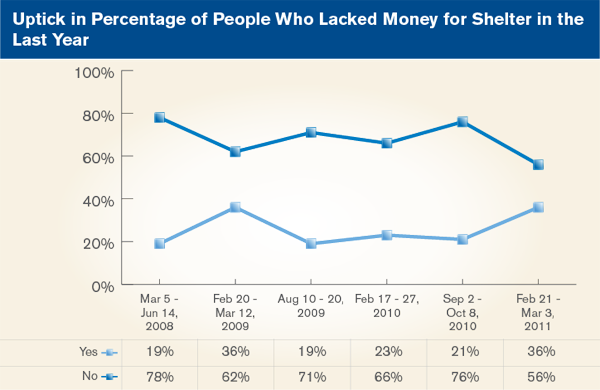
More than half of all Iraqis now say they are dissatisfied with their standard of living, and more Iraqis see their standard of living getting worse than getting better - the first time this has been the case since Gallup started asking the question three years ago.
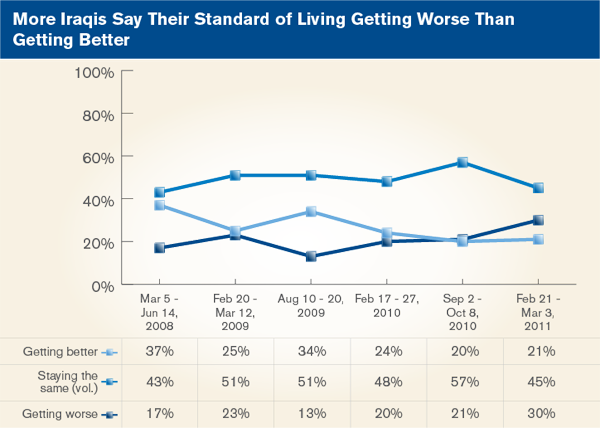
As another sign of Iraqis' rising discontent with economic conditions, the number of residents who say it is "difficult" or "very difficult" to get by on their present income has risen to 65% from 39% in early 2010.
Sense of Pessimism Coincides With Change
The deepening pessimism comes at a time when Iraqis are seeing change all around them. To begin with, there is the planned withdrawal of U.S. troops, which may complicate reconstruction efforts and plans to secure foreign investment if sectarian violence resurges after the military's departure. There are also the protests and the incipient revolutions elsewhere in the Arab world, which may be causing some Iraqis to take stock of how much control they feel they have over their own lives. Gallup has routinely asked Iraqis whether they are satisfied with their freedom to choose what they do with their lives. In 2011, 25% of Iraqis say they are satisfied, the lowest percentage yet recorded and down from 40% in late 2010.
Iraqis have staged some protests this year, but they have been relatively small and have focused mostly on poor basic services, including water and electricity. Iraq has the fourth-largest oil reserves in the world, but war and mismanagement have kept those resources from benefiting the population. Iraqis can count on only a few hours of national grid power a day - a huge problem in a country whose capital, Baghdad, has scorching summer heat, with average high temperatures in July and August of about 110º F (44º C).
The protests have also focused on the high salaries of top government officials in a country where unemployment hovers near 15% (among the youth population, it is estimated as twice that high) and roughly one in four inhabitants lives in poverty, making do on as little as $2.20 (U.S.) a day.
Government's Performance on Economy Is Particular Source of Dissatisfaction
With the exception of their military, Iraqis lack confidence in virtually every aspect of their government. In addition to the 75% of Iraqis who say government corruption is widespread, the Gallup survey shows that 66% lack confidence in the honesty of elections and 49% say they do not have confidence in the judicial system.
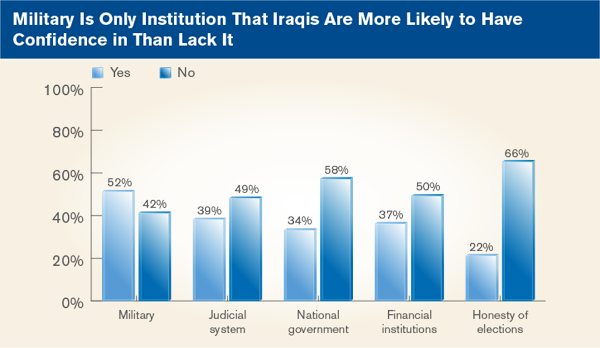
Most Iraqis also do not think the government is doing enough to promote private industry. Satisfaction with efforts to create high-quality jobs has been below 20% for the last three years, and is trending lower.
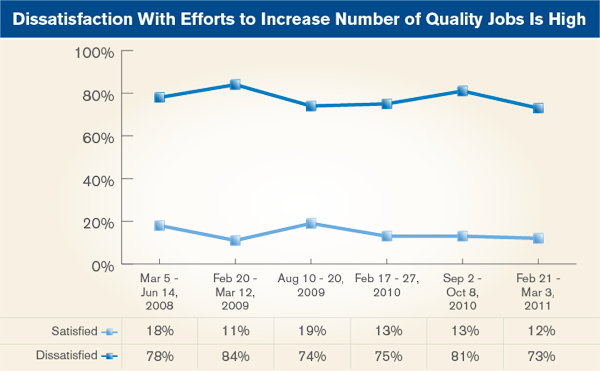
Iraqis' skepticism extends to entrepreneurship, a means of private growth that was virtually unheard of under Saddam. During that time, people with successful growing businesses quickly found themselves turning over a large portion of their revenues to the government. Those policies left Iraq with few sources of export revenue, and few international businesses that were not based on oil.
In post-Saddam Iraq, the potential of entrepreneurship has received renewed attention, thanks partly to the influence of U.S. advisers. The efforts include the establishment of small-business development centers in cities such as Baghdad, Basra, and Irbil. However, these and other development efforts have not been enough to change Iraqis' attitudes and make them more optimistic.
Sixty percent of Iraqis now say someone starting a business cannot trust their assets and property to be safe at all times. That is up from 46% less than a year earlier. Sixty-nine percent of Iraqis do not believe it is easy for someone starting a business to get a loan, and 67% say the government does not make the paperwork or permits easy enough for aspiring entrepreneurs.
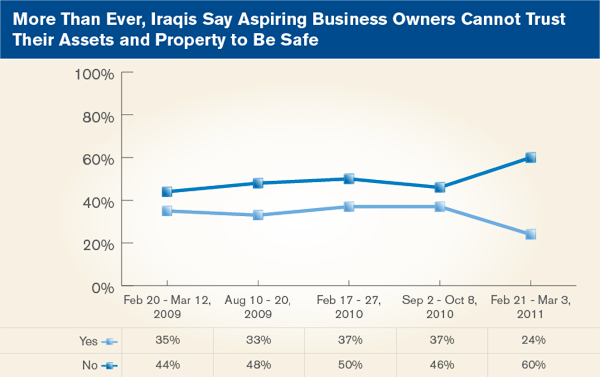
Fifty-four percent of Iraqis do not trust that the government will allow businesses to make a lot of money, and 40% think business owners will have a hard time finding hardworking and qualified employees when they need them. That is the most skepticism that Iraqis have expressed about the supply of workers in their country since Gallup began asking the question in 2009.
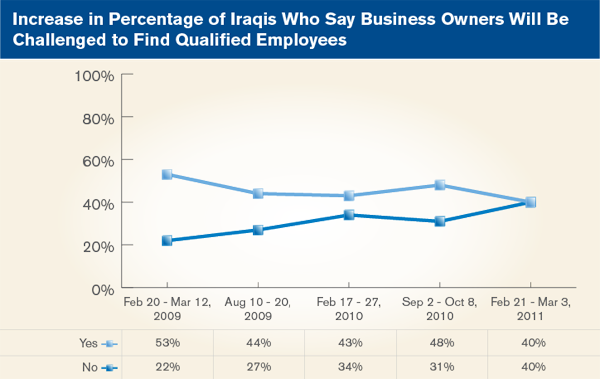
Entrepreneurs, in general, have become less attractive to Iraqis, with 39% in 2010 saying they have a generally unfavorable impression of people who start and run their own businesses. There may be a positive takeaway in this response - a decline in the percentage of Iraqis who say they do not know what they think of entrepreneurs or refuse to answer the question. That may suggest that entrepreneurialism, which has been shown to create jobs in tough economies, is not as foreign a concept to Iraqis as it was in the past.
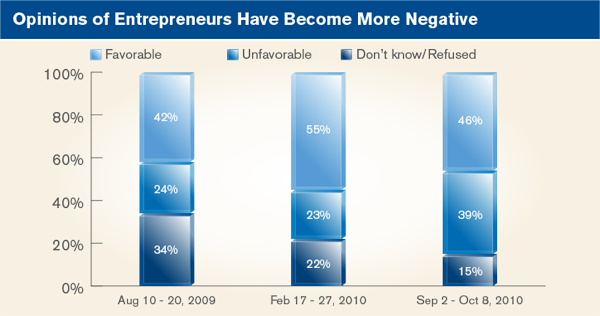
Iraqis' increasing concerns about the economy and other aspects of life in their country coincides with a marked rise in negative emotions. Stress, anger, and sadness are all much more common in Iraq now than in the past few years. Perhaps this is not surprising in a country in which bombings and assassinations still occur with some regularity, and where trauma-induced mental illnesses are common. The question - raised in a 2010 Washington Post article that noted that Iraq has only about 100 psychiatrists for a population of 30 million - is what Iraq can do to alleviate the anguish its citizens are feeling.
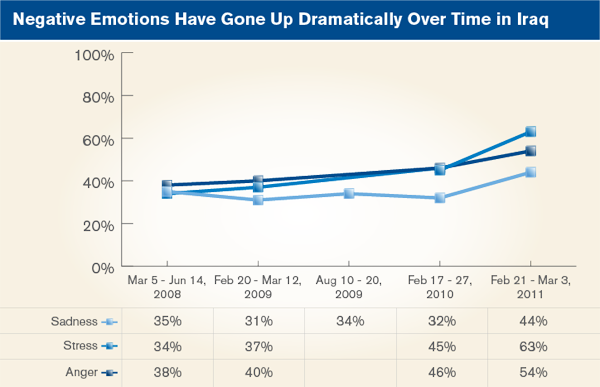
2009 data not available for the stress and anger items.
Implications
With its economy in shambles and an increasingly restive population, the Iraqi government must accomplish several things. First, it needs to take steps to end self-dealing and corruption among its own officials. Without this, the public's low confidence in government institutions will disappear altogether. Second, the government must work to maintain confidence in the military and police when the drawdown of U.S. troops happens. The government must demonstrate to Iraqis that their homes, businesses, and public gathering places will not be used as cover by insurgents - or worse, become the insurgents' targets.
Finally, the government must create jobs. Some of the mechanisms for this are already in place, with a 100,000-home residential construction project being led by a Korean company and talk of building a high-speed railway to connect Baghdad to Iraq's southern provinces. These and other projects must be financed, safeguarded, and managed in ways that will put Iraqis to work, and give them reason to hope.
Survey Methods
Gallup is entirely responsible for the management, design, and control of this study. For the past 70 years, Gallup has been committed to the principle that accurately collecting and disseminating the opinions and aspirations of people around the globe is vital to understanding our world. Gallup's mission is to provide information in an objective, reliable, and scientifically grounded manner. Gallup is not associated with any political orientation, party, or advocacy group and does not accept partisan entities as clients.
Results are based on face-to-face interviews in Iraq with 9,435 adults, from 2004 through 2011. Surveys were conducted March 22-April 9, 2004; March 5-April 1, 2008; Feb. 20-March 12, 2009; Aug. 10-20, 2009; Feb. 17-27, 2010; Sept. 2-Oct. 8, 2010; and Feb. 21-March 3, 2011. Interviews were conducted with respondents aged 18 and older in 2004 and respondents aged 15 and older from 2008 forward.
For results based on the total sample of adults, one can say with 95% confidence that the maximum margin of sampling error ranges from ±1.7 to ±3.7 percentage points. The margin of error reflects the influence of data weighting. In addition to sampling error, question wording and practical difficulties in conducting surveys can introduce error or bias into the findings of public opinion polls.
The questionnaire was translated into Arabic and Arabic and Kurdish from the Aug. 10-20, 2009, survey forward. The translation process starts with an English version. A translator who is proficient in the English and Arabic languages translates the survey into the target language. A second translator reviews the language version against the original version and recommends refinements. For more detailed information regarding the methodology, please contact the Abu Dhabi Gallup Center.
Abu Dhabi Gallup Center
The Abu Dhabi Gallup Center is a Gallup research hub based in the capital of the United Arab Emirates. It is the product of a partnership between Gallup, the world's leading public opinion research firm, and the Crown Prince Court of Abu Dhabi.
Building on Gallup's seminal work in the field of Muslim studies, the Abu Dhabi Gallup Center (ADGC) offers unmatched research on the attitudes and aspirations of Muslims around the word. In addition to its worldwide scope, the ADGC focuses on the specific priorities of its regional base and presents innovative analysis and insights on the most important challenges facing the United Arab Emirates and the Gulf Cooperation Council (GCC).